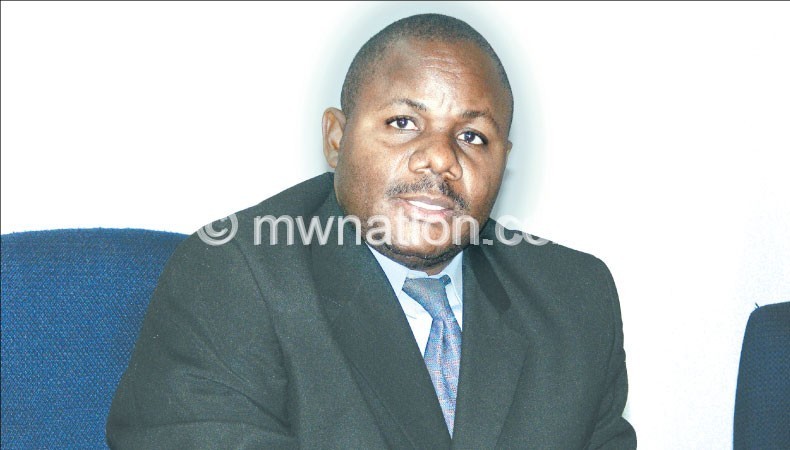Talking investment banking

CDH Investment Bank (CDHIB) is the newest player in the country’s banking sector. It was born from the transformation of Continental Discount House (CDH) in 2011. In this interview I talk to CDHIB chief executive officer Misheck Esau (ME) on investment banking and several issues. Excerpts:
AM: CDH started as Continental Discount House in the late 1990s. It has now transformed into an investment bank. Why the change?
ME:
Continental Discount House was established in 1998 as the first discount house in Malawi to offer financial services to the financial market. The discount house model helped to offer innovation investment solutions to the market dominated by traditional commercial banking services. But the advent of declining interest rates in 2008 and changing regulations made the discount house business less attractive; hence, the board made a resolution to change the institution into an investment bank with a unique model of combining both commercial banking and investment banking. The bank was given a banking licence by the Reserve Bank of Malawi (RBM) in May 2011. And on 2nd April 2012, CDHIB opened for business.
AM: What is the difference between CDH Investment Bank and existing banks in terms of services and target market?
ME:
CDHIB is a unique bank compared to the other banks in Malawi in that unlike the other banks that focus mainly on offering traditional commercial banking services, CDHIB has distinguished itself as a dynamic and innovative institution that offers a diversity of tailor-made financial solutions to both individuals and corporate customers to make their businesses grow.
In addition to the traditional commercial banking services, CDHIB has a niche market in structuring deals, trading financial instruments, raising finance and giving investment advice to clients.
AM: Briefly, would you explain the difference between a development bank and the investment bank that CDHIB is?
ME:
Well, a development bank is a financial institution, usually government sponsored, which has an explicit legal mandate to invest medium to long-term capital into bankable projects with positive externalities and socio-economic goals in sectors of the economy which are either of particular strategic importance or are currently underserved by existing financial institutions.
On the other hand, an investment bank, and CDHIB in particular, is an institution that specialises in large and complex financial transactions such as underwriting, acting as an intermediary between an issuer and the investing public, facilitating mergers and other corporate reorganisations, and acting as a financial adviser for institutional clients. In other words, the provision of financial advisory services is the domain of investment banks.
AM: Over the years, interest rates have been a thorny issue in the country, with critics faulting banks for offering “peanuts” on deposits and charging the moon on loans. Some have argued that the low interest rates on deposits offer little motivation to people to deposit; hence, perpetuating a poor saving culture. What is your take?
ME:
This perception is a result of negative perceptions to banks in general not only in Malawi, but world over. But all in all, CDHIB offers very competitive interest rates on the market in Malawi. For instance, we are the only bank in Malawi offering interest rate of two percent and 20 percent on current accounts and prime investors accounts, respectively. We also have a Smart Savers Account whose interest rate is 15 percent, which is way above the industry average. As CDHIB, our goal is to offer clients the best possible return for their funds to make their businesses grow.
AM: Does the Malawi economy need 11 banks offering more or less similar products?
ME:
Recent statistics show that Malawi still has over 46 percent of its population unbanked which means there is still need for new banks and/or existing banks to extend their reach to these unbanked segments. As more and more banks enter the market, we expect the quality of services and products to improve to the ultimate advantage of the people of Malawi and the economy in general as a thriving financial sector entails a thriving economy.
AM: As CDHIB, do you have plans to list on the Malawi Stock Exchange?
ME:
Growth is one of CDHIB’s main objectives in its strategy. The bank has a mission to grow and become publicly listed on the local bourse to raise capital for growth, provide alternative investment counters and also enhance the company’s performance monitoring. This is a medium term plan coming up for implementation in three to five years subject to stakeholder consensus at that time.
AM: Who owns CDHIB and what is your business structure?
ME:
CDHIB is a leading investment bank in Malawi. It is part of CDH Holdings Limited, a fast growing financial services group with investments in Malawi and East Africa. CDHIB combines the traditional commercial banking services and tailor-made investment banking services which include innovative, high-quality financial advisory, trade and project financing and trading among other products and services.
AM: How many new jobs has the transformation into an investment bank created?
ME:
The transformation into an investment bank has tripled the number of employees that CDH had from 23 to 80.




